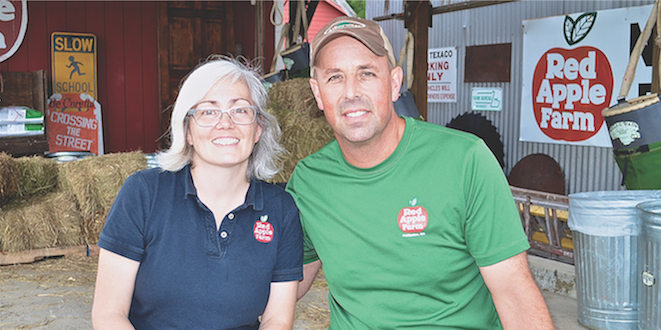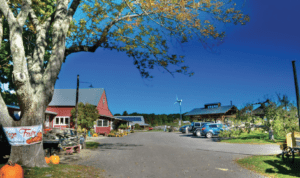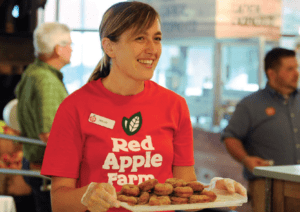

Jan 7, 2021Pick-your-own farm experiences attract customers
A weird year doesn’t have to be a bad year, one family farm operation and farm market business found out in 2020.
Third-generation growers Al and Nancy Rose have been running the family farm, Red Apple Farm in Phillipston, Massachusetts, since 2001, but the quirks of this season taught them much about
their customers and the value that family farm operations have to offer.
“It’s going to be a learning year,” Al Rose said.
A customer-centered business
The 37-acre farm, which was established in 1912 and has been in the Rose family since 1929, grows a diverse variety of crops, including blueberries, raspberries, apples, peaches, sunflowers, ornamentals, flowers and even pumpkins. At an elevation of 1,200 feet, the climate is good for fruit, but the soil in the area is notoriously rocky.
“The joke is, ‘You move three rocks, and you can plant a tree,”’ Rose said. The focus of the business has been on farm market sales for at least 20 years. While the COVID-19 pandemic and the associated precautions handed down by authorities made dealing with customers more complicated, Rose said it’s been “one of their busiest seasons.”
“Even the demand from Monday to Friday was very hot,” he said. Like many other businesses across the country, this year the farm operated on a reservation system where customers would schedule a time to visit.
Fueling the farm’s success in 2020 were “open-air packages” that allowed customers to choose multiple pick-your-own farm experiences. Depending on how many crops customers elected to pick, the “open-air package” for a small group of four ran $30-$50, with $40 about the average.
“We made them so they were a value for a family, which we thought was the right thing to do,” Al Rose said.
Each crop was limited by the size of a container – a peck bag for apples, a half-peck bag for potatoes– so that nothing had to be weighed for checkout. “Sugar pumpkins” – small pumpkins that were usually sold to school groups – were included in the bundle, and each group could pick three of them.


New experiences
Unusual weather conditions caused the pumpkins to ripen early, and this led to some interesting discoveries.
“We didn’t realize that when you put pumpkins in the package in early August, they would pick them,” Rose said. “They did – we were not expecting that. We quickly said, ‘Well, why don’t we open up the potato part of our package?
And you didn’t have to do everything in the package – you could opt-out, but they did it.”
Al Rose said the farm first started growing potatoes about 20 years ago as part of a crop rotation with pumpkins. The farm has offered potato-digging in previous seasons, but it caught on in a bigger way this year, with more than 500 people digging up their own red potatoes.
Red Apple Farm provided each group the option of a pitchfork or a rake to dig out potatoes, and an attendant to talk them through the process.
“There’s a lot of educating,” Rose said. “You would think people know that potatoes are in the ground, but we’ve had lots of stories where people are standing on the potatoes and asking where they are.” They also explained the basic potato-digging technique, to start one side of the mound and “rip through” to the other side to avoid stabbing the tubers.
“If you can show them how to do it, they get it, and there’s a sense of excitement when they find the potatoes, like a treasure hunt,” Rose said. “People were very proud of bringing home dinner. I mean, apples, you can eat them and you can make dessert, but potatoes are part of a meal. For most people that did it, it was a novel experience.”
Why it worked
The potatoes’ popularity led to the insight that customers were looking for new, authentic farm experiences. The Rose family added other pick-your-own crops to the list.
“We started doing pick-your-own ornamental corn,” Rose said. The experience included showing participants how to prepare the corn for display, pulling the husk back. Other pick-your-own experiences included picking big, orange “Daffy lantern” flowers – the Rose family grows them in the understory of an orchard – and ornamental gourds. While some customers in the peak apple-picking window from mid-September to mid-October only wanted apples, most welcomed the opportunity for a walk and more fun in the fresh air.
“We actually made people walk all through the farm, and they actually liked it,” Rose said. “To them, it was a much more fulfilling experience, because they got to do the different fruits of the farm.”
Rose and his wife attribute the popularity of open-air experiences to people’s state of mind during the pandemic. They compare it to a surge of business the farm saw in 2001 after the Sept. 11 terrorist attacks.
“People, when they have anxiety, they’re looking for things to make them feel better,” Rose said. “I think we’re very fortunate the farm provides that, whether it’s an escape or a holiday experience. … Picking potatoes, digging potatoes made people feel more normal, and I think people needed that.”
Shipping out success
Red Apple Farm’s market stays open in one form or another year-round, selling a variety of value-added food products like cider donuts, pies, fudge and even hard cider. In addition to the farm itself, the Rose family operates a stall in the Boston Public Market and at a small ski lodge, called “The Core” at nearby Wachusett Mountain.


Although the shops remained open in mid-November, the products and produce were also available for curbside pickup and home delivery.
Yankee Magazine in October listed Red Apple Farm’s cider donuts as one of 10 “Iconic New England Foods” that are sold online and shipped around the country.
“While mail-order doughnuts may never beat the ones fresh out of the fryer (likely purchased as a pick-me-up on an afternoon spent wandering through the orchards), Red Apple Farm’s version holds up to the rigors of long-distance travel,” wrote Yankee Magazine’s Amy Traverso.
The support from customers – both ordering shipments of food and produce while sheltering, and also those enjoying the farm’s open air – has been substantial, and the Rose family is counting those blessings.
“Years like this show you that people do value family farms,” Rose said.
— Stephen Kloosterman, associate editor














